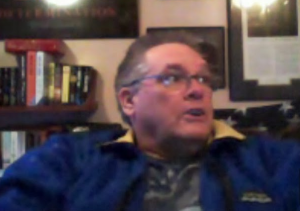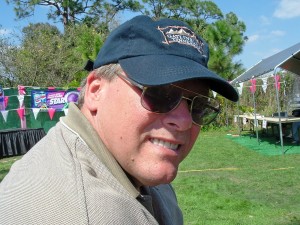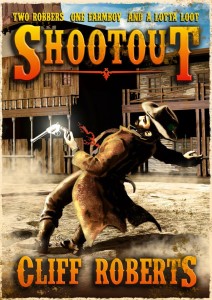Cliff Roberts burst onto the writing scene in 2013 with a huge hit. That hit was called “Reprisal: The Eagle Rises” and was followed by a multitude of hits. His latest novel “Shootout” is currently one of the bestselling westerns in the United States. Enjoy!
When did you know you wanted to be a writer? And are you interested in other forms of artistic expression? 
I have wanted to write since I was in high school but after a few college courses in creative writing, life took me in a different direction, and I didn’t have an opportunity to concentrate on writing again until I was medically retired in 2005.
I am really into photography and wood working, when I let myself stop writing for a while.
People often say that the life of a writer is a lonely one. How do you stay motivated/inspired? Do you have advice for writers going through a difficult time?
Life as a writer is lonely. But then so is the life of a sales rep, and also as a reader of books, which I do on a consistent basis. I have a sort of self-motivation within that I had to develop in my selling years as well as to overcome some of the challenges that life has provided me. I began writing with no less a goal than becoming a NY Times bestselling author. I’ve achieved bestseller status on Amazon, but it’s not quite the same. The best advice for anyone who writes is to set goals for yourself, and then follow what Ray Bradbury said: “The only way to lose at writing is to quit. SO don’t quit.” If the first book you write doesn’t quite make the bestseller list, write another and so on and so on until you do make the bestseller list. Don’t quit!
What draws you to your preferred genre? What can you never see yourself writing?
I’m a big fan of two genres in particular: Action/adventure and thriller/mystery/suspense. I am a big fan of both Tom Clancy and Elmore Leonard. I enjoy the tension that draws you through the book to the end and keeps you guessing as you read each new chapter. I like the twists and turns and the strategy it takes to plan out these types of books. In either genre, the picture you’re seeing at the moment may not be the true picture.
I cannot see myself ever writing a math or science manual. I’m just not that mathematically inclined. Anything else, hmmmm. Maybe?
What do you think makes a good story? What do you try to avoid doing at all costs in your own writing?
I like stories where the line between good and evil is blurred. The supposed antagonists and protagonists may prove to be different people by the end the story. The thing I try very hard not to do in my own writing is overusing words. Words like: that, just, quite, quickly, quipped, etc. When that happens, it doesn’t matter how good the story actually is, the reader’s mind will wander. After they’ve wandered for a few minutes, you have usually lost them.
Would you mind telling us what you think your strengths and weaknesses are?
Okay, I’m game. My strength is that I tell great story. I have been told all of my books are real page turners—books that once you start reading them, you won’t want to put them down. My biggest weakness is that I am not a very skillful writer. I write the book and then have to hand it over to an editor/proofreader. I am lousy at punctuation and only fair at grammar. But then most writers need editors, so it’s not that bad.
Who/what are your biggest influences, and why?
As I said before, I am a big fan of both Tom Clancy and Elmore Leonard, but my first real influence was H.G. Wells. H.G. is a very descriptive writer as well as a very insightful one. Tom Clancy and Elmore Leonard are similar. Clancy and Leonard I discovered once I was adult, and H.G. Wells I read when I was in my early teens.
What makes your genre unique? And why is it so popular, or perhaps less popular than it could be?
I’m not so sure my genre is unique, but the stories I tell are unique. It’s been said that there is nothing new in the world, especially in the writing field. We merely take what is already written and paraphrase it to give it a new and exciting sound. That may be true, but I like to think that when a reader picks up my books, they will get something if not new, at least very different. I think that’s what makes them so popular. They are easy to read, yet complicated with a lot things you don’t see coming. Plus, I work very hard to create characters who we all can relate to.
The Reprisal series combines and political thriller with an action adventure. A computer billionaire recruits and funds an emotionally devastated newly-retired Chairman of the Joint Chiefs to create a corporate security team that will no longer wait for terrorists to attack the United States, they will go out and pre-empt the terrorists and kill them in their own homes or their safe havens. On the home front, they take on the sitting president who is ignoring the Constitution and is using executive orders to rule the country as if he were a dictator. Now, before you jump up and start claiming that I have done nothing but use Obama as the presidential example to write the books, I wrote the book in 2005, long before Obama was in office.
Fatal Mistake is about a man whose wife is cheating on him and he decides instead of going through a divorce and losing everything, it’s cheaper to bury her in the backyard garden. Everything is planned perfectly, but before he can kill his soon-to-be ex-wife, everything starts to unravel. Before he knows what has hit him, the murderous husband is burying a stranger, and his sister-in-law, as far he knows, has gone to the police. Now it is a race against time to bury the past and avoid making the fatal mistake. If he can avoid getting caught, he can live a long and wonderful life. But life (or fate) keeps placing challenges in his path one after another involving the sister-in-law, the police, a mob boss, a private investigator and a team of hit men sent to kill him. Fatal Mistake clearly shows that everybody makes mistakes, and it only take one mistake to get caught.
Conch Republic is about a middle-aged, medically retired man who happens to write books as a hobby to fill his time. He also happens to keep finding himself in situations where he has to solve a crime to either keep from going to prison or to keep from being killed. The main character is Nate Nevwas. He’s nice enough, and if he’s your friend, he’ll stand by you no matter what. His fatal flaws are that he has an acid tongue and only knows how to speak sarcasm. He’s quick to come to the rescue of damsels in distress, which is the main reason he’s always under suspicion for one crime or another; and he also just can’t keep his nose out of other people’s business. He suffers from terminal curiosity.
While attempting to help such a damsel, Nate stumbles onto a gang planning to steal a sunken treasure before the person who discovered it can excavate it themselves from the ocean floor. Nate and his friend Mason (a retired NFL superstar who, after football, chose to become a sheriff’s deputy in his hometown of Marathon, Florida) get involved in quite the adventure. Together, Nate and Mason find themselves battling hired killers, pirates and the mob who are all seeking to lay claim to the treasure. The story takes the duo from Key West to the Everglades to the high seas and back again, leaving a trail of bodies like bread crumbs behind them.
Can you tell us about other books or projects you are working on?
Currently, I have two recent releases. The first one is a book on selling. It’s titled Is There Something I Should Know? It’s non-fiction, and it will help anyone to understand the sales process better, thus making them a better salesperson. The main focus is on how to stop being that annoying pest that most people don’t trust to becoming the salesperson who is a trusted friend in the sale process.
One of the most important things for everyone to remember is that we are all salespeople.
The second book is “Reprisal! The Eagle’s Sorrow.” It is the third book in the Reprisal! Series. The book takes place across the globe as usual, but it focuses on Europe and a terrorist attack on Hamburg, Germany. As in previous books, the attack is led by Yousef Al-Sintani, the cell leader for the attacks on Houston and San Antonio. I don’t dare tell you anymore because I don’t want to ruin the story for any of my fans.
For those of us trying to figure out the marketing aspect, what tips can you share? How did you come to establish your support team?
This is a good question. Not every book can be sold the same way, but every book needs something in common with every other book. They all need be exposed to the public. I have a somewhat complicated marketing plan where I personally spend a large amount of time posting to Facebook and Google. My career was masterminded by Nick Wale at Novel Ideas in order to get a pro’s touch for the ads I run, blog content, website content, SEO, keywords, and a host of other advertising challenges. When we first met he knew I had the talent, but I didn’t have the exposure. We worked together on getting my work edited and we released my first book. It was a huge hit. So I recommend hiring professional help. There is just too much for the author to handle and still be able to write. I, for one, don’t want to spend time working the Internet with blurbs. I want to write.
What do you find is the most difficult aspect of writing, and how do you cope with it?
I don’t really view any part of writing as difficult. It comes quiet easy to me. The biggest challenge as an author is getting noticed in the sea of authors and their books that flood the reading public yearly. Without gaining the exposure that will set me apart from the other authors out there, it’s a near-thankless job. Until the readers start reading your book, are you really an author? It took me seven years to finally gain a following that is growing. My first four novels have all managed to become #1 bestsellers on Kindle. With that recognition, the sales have taken off, and I am hopefully building a steady and faithful fan base that helps with my other books I plan to release in the future.
 What is the best piece of (writing) advice anyone ever gave you?
What is the best piece of (writing) advice anyone ever gave you?
I haven’t received any direct advice from another author, so I’ve taken the comments made by major authors and tried to follow them. Like Tom Clancy’s statement: “The difference between fiction and reality is that fiction has to make sense.”
Read, read and read some more. DO your research because fiction has to not only make sense, but also has to be as realistic as possible!
*****
TWO ROBBERS, ONE YOUNG FARMER AND WHOLE LOTTA LOOT!
THE SCORE CAN ONLY BE SETTLED BY SHOOTING IT OUT!
SHOOTOUT!
A daring bank robbery leaves one robber wounded and the bank manager dead. Sticking to their original plan the two robbers leave town separately to allay suspicions, planning to rendezvous in the nearby forest and split the loot. But even the best of plans can go aerie.
A young farmer out hunting mistakes the wounded robber for a wild animal and accidentally kills him. While searching through the dead man’s belongings he comes across the money from the robbery and decides to keep it for himself. But when the second robber spots his partner’s horse at the farmers homestead he confronts the farmer, determined to get his money back.
Despite ripping his life to shreds the farmer proves to be more resilient than expected and fights back. His courage and resolve forces the bank robber to escalate his efforts and finally risk it all in a face to face shootout!



You must log in to post a comment.